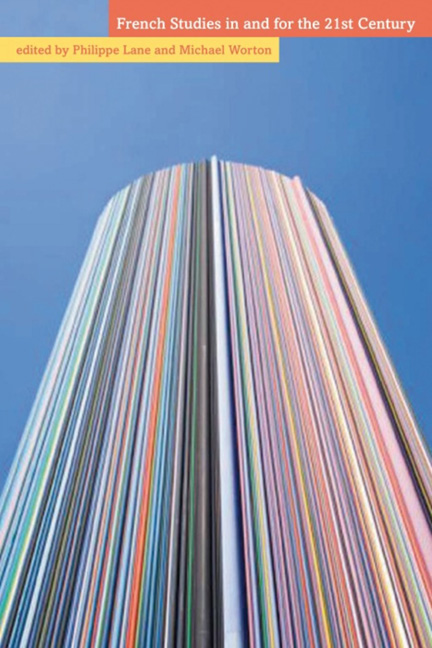Book contents
- Frontmatter
- Contents
- Notes on Contributors
- Foreword
- Foreword by His Excellency
- Part I: Contextualisations
- Part II: Research and Public Engagement Strategies
- Part III: The Place of Women and Gender in French Studies
- Part IV: The Place of Literature
- Part V: The Place of Linguistics in French Studies Today
- Part VI: Theatre, Cinema and Popular Culture
- 14 Teaching and Research in French Cinema
- 15 Popular Culture, the Final Frontier: How Far Should We Boldly Go?
- Part VII: Area Studies, Postcolonial Studies and War and Culture Studies
- Part VIII: Adventures in Language Teaching
- Appendices. Addresses to the Future of French Studies Conference
15 - Popular Culture, the Final Frontier: How Far Should We Boldly Go?
from Part VI: Theatre, Cinema and Popular Culture
- Frontmatter
- Contents
- Notes on Contributors
- Foreword
- Foreword by His Excellency
- Part I: Contextualisations
- Part II: Research and Public Engagement Strategies
- Part III: The Place of Women and Gender in French Studies
- Part IV: The Place of Literature
- Part V: The Place of Linguistics in French Studies Today
- Part VI: Theatre, Cinema and Popular Culture
- 14 Teaching and Research in French Cinema
- 15 Popular Culture, the Final Frontier: How Far Should We Boldly Go?
- Part VII: Area Studies, Postcolonial Studies and War and Culture Studies
- Part VIII: Adventures in Language Teaching
- Appendices. Addresses to the Future of French Studies Conference
Summary
This chapter is about the place of contemporary popular culture in French Studies. Both ‘populaire’ and ‘popular’ are of course problematic epithets, but I do not wish to encumber this particular discussion with matters of definition, important as they are at an epistemological level. I therefore use ‘popular culture’ in its common English sense, referring to contemporary industrialised forms and practices such as pop music, television, commercial cinema, pulp fiction, and so on, which reach a large, sociologically diverse audience. In French, such forms and practices have often been pejoratively referred to as la culture de masse, though this is changing, as with the rise of the term culture médiatique for example. ‘Populaire’, meanwhile, has conventionally been reserved for traditional, ‘folk’ cultures, whether working class or peasant (though this too is changing). But in this conventional sense, la culture populaire is of a somewhat different nature and its situation within French culture, and French Studies, raises different issues, so it is not my main concern here.
Popular culture in the sense I have chosen has only recently become a focus of research in UK French departments, and its place in our discipline remains problematic. Of course, popular artefacts like youth magazines, BD, television programmes or songs have long been used in language teaching. As far back as 1967, when my own undergraduate studies in French began, I discovered Brel and Brassens not in an option on popular music, inconceivable in those days, but in a language-lab comprehension exercise. And over the next thirty years or so, study of popular culture in the ‘content’ courses of French Studies degrees, as an object of textual analysis or criticism, remained exceptional. It is true that by 1997 I might have encountered Brel or Brassens in a chanson module somewhere. But I would have been likely to study them primarily as singing poets rather than as mass-cultural products of a powerful creative industry. Indeed, in France as in Britain, academic discourse until quite recently tended to present chanson as only meriting advanced study by virtue of its literary qualities.
- Type
- Chapter
- Information
- French Studies in and for the 21st Century , pp. 184 - 194Publisher: Liverpool University PressPrint publication year: 2011



